节气之惊蛰(英文版)
“惊蛰”的英文表达方式
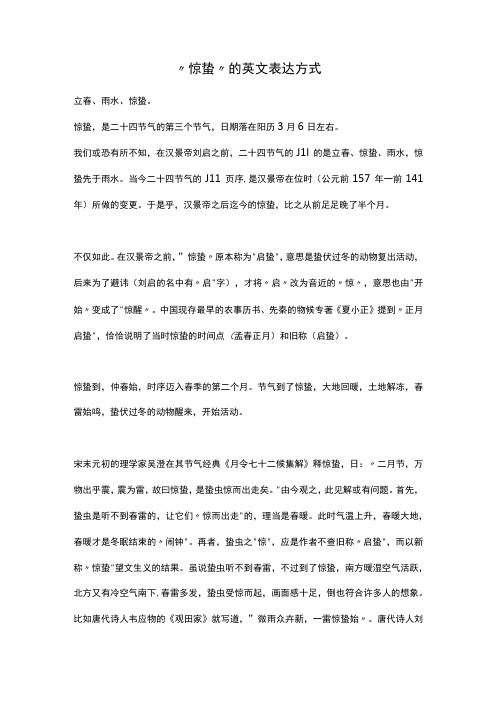
〃惊蛰〃的英文表达方式立春、雨水、惊蛰。
惊蛰,是二十四节气的第三个节气,日期落在阳历3月6日左右。
我们或恐有所不知,在汉景帝刘启之前,二十四节气的J1I的是立春、惊蛰、雨水,惊蛰先于雨水。
当今二十四节气的J11页序,是汉景帝在位时(公元前157年一前141年)所做的变更。
于是乎,汉景帝之后迄今的惊蛰,比之从前足足晚了半个月。
不仅如此。
在汉景帝之前,”惊蛰〃原本称为"启蛰",意思是蛰伏过冬的动物复出活动,后来为了避讳(刘启的名中有〃启"字),才将〃启〃改为音近的〃惊〃,意思也由"开始〃变成了"惊醒〃。
中国现存最早的农事历书、先秦的物候专著《夏小正》提到〃正月启蛰",恰恰说明了当时惊蛰的时间点(孟春正月)和旧称(启蛰)。
惊蛰到,仲春始,时序迈入春季的第二个月。
节气到了惊蛰,大地回暖,土地解冻,春雷始鸣,蛰伏过冬的动物醒来,开始活动。
宋末元初的理学家吴澄在其节气经典《月令七十二候集解》释惊蛰,日:〃二月节,万物出乎震,震为雷,故曰惊蛰,是蛰虫惊而出走矣。
"由今观之,此见解或有问题。
首先,蛰虫是听不到春雷的,让它们〃惊而出走"的,理当是春暖。
此时气温上升,春暖大地,春暖才是冬眠结束的〃闹钟"。
再者,蛰虫之"惊",应是作者不查旧称〃启蛰",而以新称〃惊蛰"望文生义的结果。
虽说蛰虫听不到春雷,不过到了惊蛰,南方暖湿空气活跃,北方又有冷空气南下,春雷多发,蛰虫受惊而起,画面感十足,倒也符合许多人的想象。
比如唐代诗人韦应物的《观田家》就写道,”微雨众卉新,一雷惊蛰始〃。
唐代诗人刘长卿在其诗作《惊蛰》中,头两句的“忽闻天公霹雳声,禽兽虫笏(Zhi)倒乾坤〃,更是音效与动感兼具,一下子就让人融入画面,仿佛身历其境。
惊蛰的英文怎么说?2023年北京冬奥会开幕式的节气倒计时用了AwakeningOf1nSeCtS(字面"昆虫之苏醒”),这也是中国气象局、《中国日报》(⑦为苫Dai1y)和中国国际电视台(CGTN)所采用的。
24 Solar Terms - Insects Awaken(惊蛰)-中国文化之24节气 小学英语
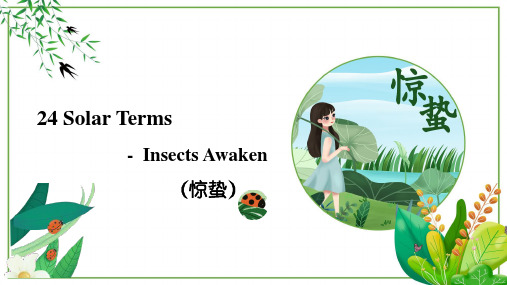
scarifice /ˈskærɪfaɪ/ v/ n.牺牲,献出【短语】human sacrifice 人祭;活人献祭 at the sacrifice of 以牺牲…为代价【例句】I thanked my parents for all their self-sacrifice on my behalf. 我感谢父母为我所做的一切牺牲。
rainfall /ˈreɪnfɔːl/ n. 降雨量【短语】annual rainfall 年降雨量 artificial rainfall 人工降雨【例句】Rainfall is also increased in cities. 城市的降雨量也在增加。
Practice
Vocabulary
Vocabulary
mark /ma:k/ 标志着【短语】mark on 标上【例句】Her unhappy childhood left an indelible mark. 她不幸的童年留下了不可磨灭的痕迹。
Vocabulary
The introduction
未过惊蛰先打雷,四十九天云不开
...的结束
...的开始
天气预报
异常
Text
Three phenomena of Awakening of Insects
Just like the meaning of the name, when Awakening of Insects comes, animals sleeping in winter are awakened by spring thunder and the earth begins to come back to life. It is the key time for spring agriculture.The first pentad, peach blooming. (一候桃始华)After Awakening of Insects, all plants are sprouting or blooming, peach blossom is the first scenery to be appreciated.
惊蛰英文介绍
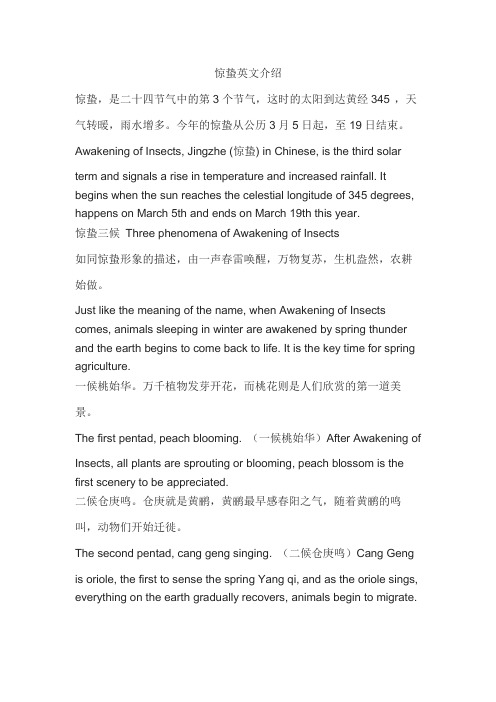
惊蛰英文介绍惊蛰,是二十四节气中的第3个节气,这时的太阳到达黄经345°,天气转暖,雨水增多。
今年的惊蛰从公历3月5日起,至19日结束。
Awakening of Insects, Jingzhe (惊蛰) in Chinese, is the third solarterm and signals a rise in temperature and increased rainfall. It begins when the sun reaches the celestial longitude of 345 degrees, happens on March 5th and ends on March 19th this year.惊蛰三候Three phenomena of Awakening of Insects如同惊蛰形象的描述,由一声春雷唤醒,万物复苏,生机盎然,农耕始做。
Just like the meaning of the name, when Awakening of Insects comes, animals sleeping in winter are awakened by spring thunder and the earth begins to come back to life. It is the key time for spring agriculture.一候桃始华。
万千植物发芽开花,而桃花则是人们欣赏的第一道美景。
The first pentad, peach blooming. (一候桃始华)After Awakening ofInsects, all plants are sprouting or blooming, peach blossom is the first scenery to be appreciated.二候仓庚鸣。
仓庚就是黄鹂,黄鹂最早感春阳之气,随着黄鹂的鸣叫,动物们开始迁徙。
关于惊蛰的英文介绍
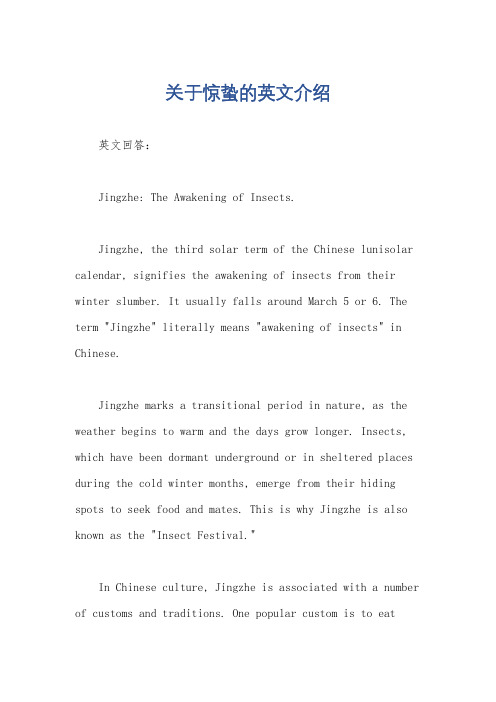
关于惊蛰的英文介绍英文回答:Jingzhe: The Awakening of Insects.Jingzhe, the third solar term of the Chinese lunisolar calendar, signifies the awakening of insects from their winter slumber. It usually falls around March 5 or 6. The term "Jingzhe" literally means "awakening of insects" in Chinese.Jingzhe marks a transitional period in nature, as the weather begins to warm and the days grow longer. Insects, which have been dormant underground or in sheltered places during the cold winter months, emerge from their hiding spots to seek food and mates. This is why Jingzhe is also known as the "Insect Festival."In Chinese culture, Jingzhe is associated with a number of customs and traditions. One popular custom is to eat"Jingzhe eggs." These are eggs that have been boiled on the day of Jingzhe and are believed to have special health benefits. Jingzhe eggs are often given to children and the elderly as a symbol of good health and longevity.Another Jingzhe tradition is to drink "Jingzhe wine." This wine is made from fermented glutinous rice and is believed to have medicinal properties. Drinking Jingzhe wine is said to ward off illness and promote health.Jingzhe is also an important time for farmers. It is the time to prepare the fields for spring planting. Farmers often burn incense and offer sacrifices to the gods of agriculture during this time, praying for a good harvest.中文回答:惊蛰,万物复苏。
二十四节气歌英语

竭诚为您提供优质文档/双击可除二十四节气歌英语篇一:英语二十四节气歌二十四节气the24solarterms立春thebeginningofspring雨水Rainwater惊蛰thewakingofInsects春分thespringequinox清明purebrightness谷雨grainRain立夏thebeginningofsummer小满grainFull芒种graininear夏至thesummersolstice小暑slightheat大暑greatheat立秋thebeginningofAutumn处暑theLimitofheat白露whiteDew秋分theAutumnalequinox寒露coldDew霜降FrostsDescent立冬thebeginningofwinter小雪slightsnow大雪greatsnow冬至thewintersolstice小寒slightcold大寒greatcold《新汉英大辞典》版篇二:二十四节气来历和英文翻译,节气歌二十四节气歌春雨惊春清谷天,夏满芒夏暑相连,秋处露秋寒霜降,冬雪雪冬小大寒。
上半年是六廿一,下半年来八廿三,每月两节日期定,最多不差一二天。
名称name开始日期beginning立春thebeginningofspring(1stsolarterm)Feb.3,4,or5 雨水Rainwater(2ndsolarterm)Feb.18,19or20惊蜇thewakingofInsects(3rdsolarterm)mar.5,6,or7 春分thespringequinox(4thsolarterm)mar.20,21or22 清明purebrightness(5thsolarterm)Apr.4,5or6谷雨grainRain(6thsolarterm)Apr.19,20or21立夏thebeginningofsummer(7thsolarterm)may5,6or7小满LesserFullnessofgrain(8thsolarterm)may20,21or22 芒种graininbeard(9thsolarterm)Jun.5,6or7夏至thesummersolstice(10thsolarterm)Jun.21or22 小暑Lesserheat(11thsolarterm)Jul.6,7or8大暑greaterheat(12thsolarterm)Jul.22,23or24立秋thebeginningofAutumn(13thsolarterm)Aug.7,8or9 处暑theendofheat(14thsolarterm)Aug.22,23or24白露whiteDew(15thsolarterm)sep.7,8or9秋分theAutumnequinox(16thsolarterm)sep.22,23or24 寒露coldDew(17thsolarterm)oct.8or9霜降FrostsDescent(18thsolarterm)oct.23or24立冬thebeginningofwinter(19thsolarterm)nov.7or8 小雪Lessersnow(20thsolarterm)nov.22or23大雪greatersnow(21thsolarterm)Dec.6,7or8冬至thewintersolstice(22thsolarterm)Dec.21,22or23 小寒Lessercold(23thsolarterm)Jan.5,6or7大寒greatercold(24thsolarterm)Jan.20or2二十四节气二十四节气是我国劳动人民独创的文化遗产,它能反映季节的变化,指导农事活动,影响着千家万户的衣食住行。
英语介绍惊蛰
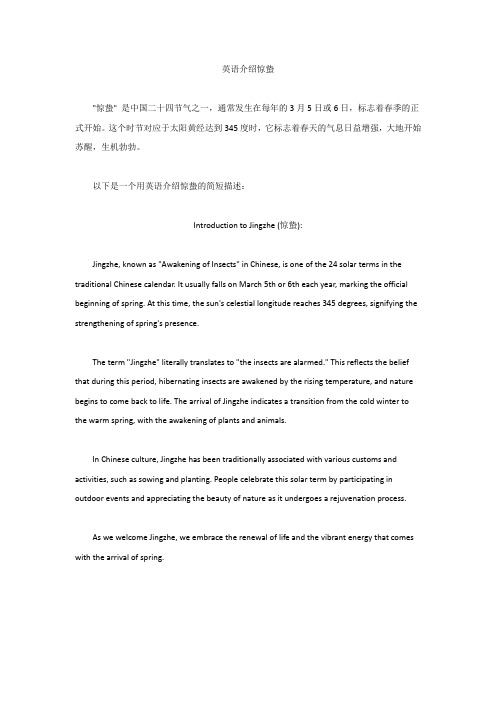
英语介绍惊蛰"惊蛰" 是中国二十四节气之一,通常发生在每年的3月5日或6日,标志着春季的正式开始。
这个时节对应于太阳黄经达到345度时,它标志着春天的气息日益增强,大地开始苏醒,生机勃勃。
以下是一个用英语介绍惊蛰的简短描述:Introduction to Jingzhe (惊蛰):Jingzhe, known as "Awakening of Insects" in Chinese, is one of the 24 solar terms in the traditional Chinese calendar. It usually falls on March 5th or 6th each year, marking the official beginning of spring. At this time, the sun's celestial longitude reaches 345 degrees, signifying the strengthening of spring's presence.The term "Jingzhe" literally translates to "the insects are alarmed." This reflects the belief that during this period, hibernating insects are awakened by the rising temperature, and nature begins to come back to life. The arrival of Jingzhe indicates a transition from the cold winter to the warm spring, with the awakening of plants and animals.In Chinese culture, Jingzhe has been traditionally associated with various customs and activities, such as sowing and planting. People celebrate this solar term by participating in outdoor events and appreciating the beauty of nature as it undergoes a rejuvenation process.As we welcome Jingzhe, we embrace the renewal of life and the vibrant energy that comes with the arrival of spring.。
二十四节气歌英语

竭诚为您提供优质文档/双击可除二十四节气歌英语篇一:英语二十四节气歌二十四节气the24solarterms立春thebeginningofspring雨水Rainwater惊蛰thewakingofInsects春分thespringequinox清明purebrightness谷雨grainRain立夏thebeginningofsummer小满grainFull芒种graininear夏至thesummersolstice小暑slightheat大暑greatheat立秋thebeginningofAutumn处暑theLimitofheat白露whiteDew秋分theAutumnalequinox寒露coldDew霜降FrostsDescent立冬thebeginningofwinter小雪slightsnow大雪greatsnow冬至thewintersolstice小寒slightcold大寒greatcold《新汉英大辞典》版篇二:二十四节气来历和英文翻译,节气歌二十四节气歌春雨惊春清谷天,夏满芒夏暑相连,秋处露秋寒霜降,冬雪雪冬小大寒。
上半年是六廿一,下半年来八廿三,每月两节日期定,最多不差一二天。
名称name开始日期beginning立春thebeginningofspring(1stsolarterm)Feb.3,4,or5 雨水Rainwater(2ndsolarterm)Feb.18,19or20惊蜇thewakingofInsects(3rdsolarterm)mar.5,6,or7 春分thespringequinox(4thsolarterm)mar.20,21or22 清明purebrightness(5thsolarterm)Apr.4,5or6谷雨grainRain(6thsolarterm)Apr.19,20or21立夏thebeginningofsummer(7thsolarterm)may5,6or7小满LesserFullnessofgrain(8thsolarterm)may20,21or22 芒种graininbeard(9thsolarterm)Jun.5,6or7夏至thesummersolstice(10thsolarterm)Jun.21or22 小暑Lesserheat(11thsolarterm)Jul.6,7or8大暑greaterheat(12thsolarterm)Jul.22,23or24立秋thebeginningofAutumn(13thsolarterm)Aug.7,8or9 处暑theendofheat(14thsolarterm)Aug.22,23or24白露whiteDew(15thsolarterm)sep.7,8or9秋分theAutumnequinox(16thsolarterm)sep.22,23or24 寒露coldDew(17thsolarterm)oct.8or9霜降FrostsDescent(18thsolarterm)oct.23or24立冬thebeginningofwinter(19thsolarterm)nov.7or8 小雪Lessersnow(20thsolarterm)nov.22or23大雪greatersnow(21thsolarterm)Dec.6,7or8冬至thewintersolstice(22thsolarterm)Dec.21,22or23 小寒Lessercold(23thsolarterm)Jan.5,6or7大寒greatercold(24thsolarterm)Jan.20or2二十四节气二十四节气是我国劳动人民独创的文化遗产,它能反映季节的变化,指导农事活动,影响着千家万户的衣食住行。
惊蛰节气的特点和风俗英文版
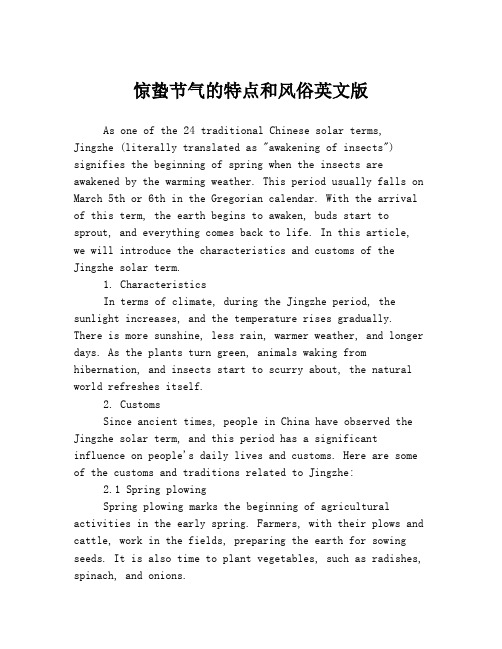
惊蛰节气的特点和风俗英文版As one of the 24 traditional Chinese solar terms, Jingzhe (literally translated as "awakening of insects") signifies the beginning of spring when the insects are awakened by the warming weather. This period usually falls on March 5th or 6th in the Gregorian calendar. With the arrival of this term, the earth begins to awaken, buds start to sprout, and everything comes back to life. In this article, we will introduce the characteristics and customs of the Jingzhe solar term.1. CharacteristicsIn terms of climate, during the Jingzhe period, the sunlight increases, and the temperature rises gradually. There is more sunshine, less rain, warmer weather, and longer days. As the plants turn green, animals waking from hibernation, and insects start to scurry about, the natural world refreshes itself.2. CustomsSince ancient times, people in China have observed the Jingzhe solar term, and this period has a significant influence on people's daily lives and customs. Here are some of the customs and traditions related to Jingzhe:2.1 Spring plowingSpring plowing marks the beginning of agricultural activities in the early spring. Farmers, with their plows and cattle, work in the fields, preparing the earth for sowing seeds. It is also time to plant vegetables, such as radishes, spinach, and onions.2.2 Offer sacrifices to ancestorsAncestral worship is an essential custom in Chinese culture. During Jingzhe, people offer sacrifices to their ancestors, pray for their blessings, and hope that they will bring good fortune to their families.2.3 Clearing pestsJingzhe is the time to clear pests in the fields and homes. Farmers will use pesticides to eliminate pests that can harm their crops, and households clean up their homes and surroundings to prevent insects from entering.2.4 Eating Jingzhe congeeEating Jingzhe congee is a custom that originated from the ancient Chinese royal court. On the day of Jingzhe, the emperor would hold a ceremony and offer Jingzhe congee to the royal ancestors. Nowadays, many people still eat Jingzhe congee as a way of celebrating the arrival of spring.3. ConclusionIn conclusion, Jingzhe is one of the essential solar terms in China, indicating the beginning of spring and the awakening of nature. It has significant influences onpeople's daily lives and customs. The customs and traditions attached to Jingzhe not only reflect the ancient Chinese wisdom to adapt to changes in nature but also offer a glimpse into the rich and diverse Chinese culture.。
惊蛰节气英文介绍
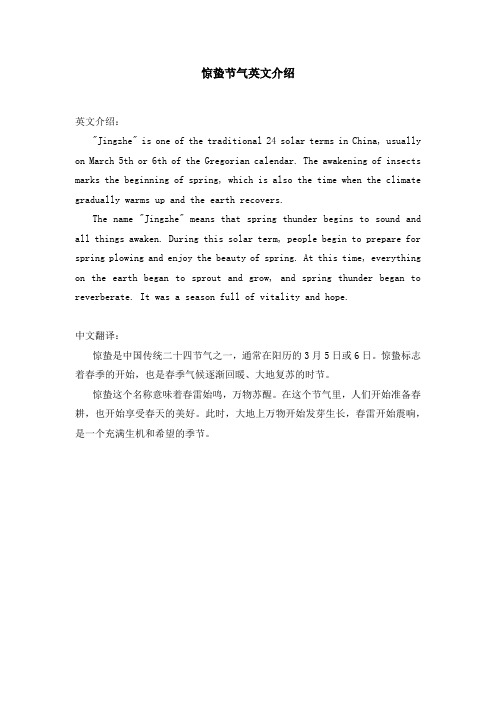
惊蛰节气英文介绍英文介绍:"Jingzhe" is one of the traditional 24 solar terms in China, usually on March 5th or 6th of the Gregorian calendar. The awakening of insects marks the beginning of spring, which is also the time when the climate gradually warms up and the earth recovers.The name "Jingzhe" means that spring thunder begins to sound and all things awaken. During this solar term, people begin to prepare for spring plowing and enjoy the beauty of spring. At this time, everything on the earth began to sprout and grow, and spring thunder began to reverberate. It was a season full of vitality and hope.中文翻译:惊蛰是中国传统二十四节气之一,通常在阳历的3月5日或6日。
惊蛰标志着春季的开始,也是春季气候逐渐回暖、大地复苏的时节。
惊蛰这个名称意味着春雷始鸣,万物苏醒。
在这个节气里,人们开始准备春耕,也开始享受春天的美好。
此时,大地上万物开始发芽生长,春雷开始震响,是一个充满生机和希望的季节。
惊蛰习俗作文模板英语
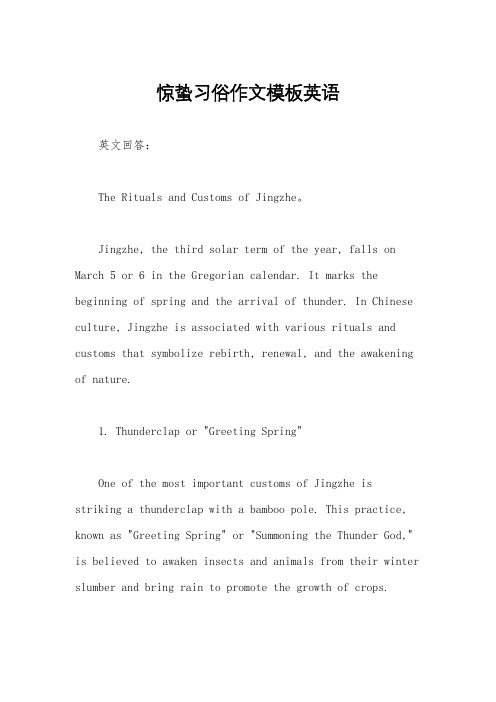
惊蛰习俗作文模板英语英文回答:The Rituals and Customs of Jingzhe。
Jingzhe, the third solar term of the year, falls on March 5 or 6 in the Gregorian calendar. It marks the beginning of spring and the arrival of thunder. In Chinese culture, Jingzhe is associated with various rituals and customs that symbolize rebirth, renewal, and the awakening of nature.1. Thunderclap or "Greeting Spring"One of the most important customs of Jingzhe isstriking a thunderclap with a bamboo pole. This practice, known as "Greeting Spring" or "Summoning the Thunder God," is believed to awaken insects and animals from their winter slumber and bring rain to promote the growth of crops.2. Eating Pea Jelly。
Pea jelly is a traditional food consumed during Jingzhe. Made from green peas, it symbolizes purity, rejuvenation, and good luck. Eating pea jelly is believed to bring health and prosperity in the coming year.3. Pest Control。
二十四节气英文名称

二十四节气the Twenty-Four Solar Termsa day marking one of the 24 divisions of the solar year in the traditional Chinese calendar▪立春(The Beginning of Spring):春季的开始。
▪雨水(Rain Water):降雨开始,雨量渐增。
▪惊蛰(The Waking of Insects):春雷乍动,惊醒了蛰伏冬眠的动物。
▪春分(The Spring Equinox):春分即是昼夜平分。
▪清明(Pure Brightness):天朗气清。
▪谷雨(Grain Rain):雨量充足而及时,谷类作物得到滋润,茁壮成长。
▪立夏(The Beginning of Summer):夏季的开始。
▪小满(Lesser Fullness of Grain):麦类等夏熟作物籽粒开始饱满。
▪芒种(Grain in Beard):麦类等有芒作物成熟。
▪夏至(The Summer Solstice):炎热的夏天来临。
▪小暑(Lesser Heat):气候开始炎热。
▪大暑(Greater Heat):一年中最热的时候。
▪立秋(The Beginning of Autumn):秋季的开始。
▪处暑(The End of Heat):处是终止、躲藏的意思。
处暑是表示炎热的暑天结束。
▪白露(White Dew):天气转凉,露凝而白。
▪秋分(The Autumn Equinox):昼夜平分。
▪寒露(Cold Dew):露水以寒,将要结冰。
▪霜降(Frost's Descent):持续降温,开始有霜。
▪立冬(The Beginning of Winter):冬季的开始。
▪小雪(Lesser Snow):开始下雪。
▪大雪(Greater Snow):降雪量增多,地面可能积雪。
▪冬至(The Winter Solstice):寒冷的冬天来临。
二十四节气惊蛰吃梨作文
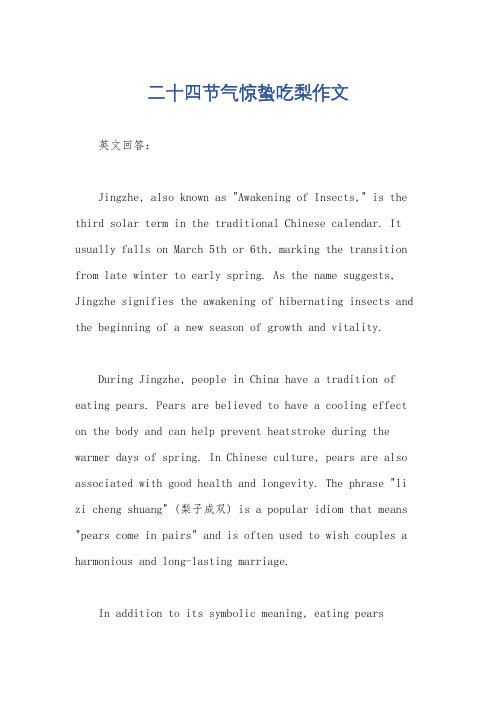
二十四节气惊蛰吃梨作文英文回答:Jingzhe, also known as "Awakening of Insects," is the third solar term in the traditional Chinese calendar. It usually falls on March 5th or 6th, marking the transition from late winter to early spring. As the name suggests, Jingzhe signifies the awakening of hibernating insects and the beginning of a new season of growth and vitality.During Jingzhe, people in China have a tradition of eating pears. Pears are believed to have a cooling effect on the body and can help prevent heatstroke during the warmer days of spring. In Chinese culture, pears are also associated with good health and longevity. The phrase "li zi cheng shuang" (梨子成双) is a popular idiom that means "pears come in pairs" and is often used to wish couples a harmonious and long-lasting marriage.In addition to its symbolic meaning, eating pearsduring Jingzhe is also a practical choice. Pears are rich in vitamins and minerals, such as vitamin C and potassium, which can boost the immune system and promote overall well-being. They are also a good source of dietary fiber, which aids digestion and helps maintain a healthy weight.Furthermore, pears are versatile and can be enjoyed in various ways. They can be eaten fresh, juiced, or used in cooking and baking. One popular Chinese dessert made with pears is "Bai Li Xiang" (百梨香), which is a sweet soup made with pears, rock sugar, and other ingredients. This refreshing and nourishing dessert is especially popular during Jingzhe.中文回答:惊蛰是中国传统农历二十四节气中的第三个节气,通常在3月5日或6日出现,标志着冬季末尾向春季的过渡。
惊蛰节气中英文介绍
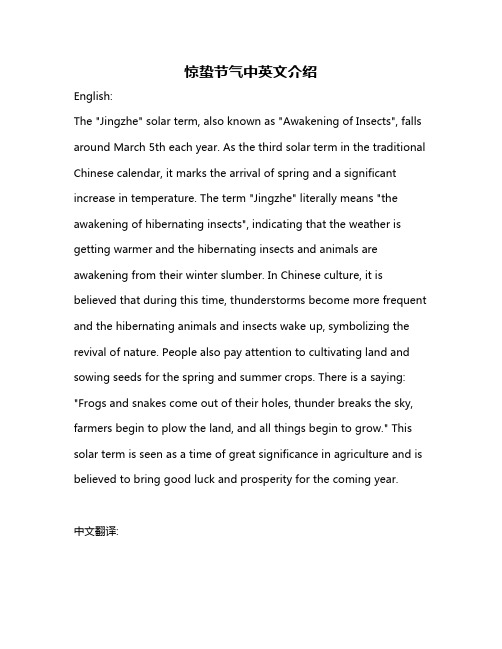
惊蛰节气中英文介绍English:The "Jingzhe" solar term, also known as "Awakening of Insects", falls around March 5th each year. As the third solar term in the traditional Chinese calendar, it marks the arrival of spring and a significant increase in temperature. The term "Jingzhe" literally means "the awakening of hibernating insects", indicating that the weather is getting warmer and the hibernating insects and animals are awakening from their winter slumber. In Chinese culture, it is believed that during this time, thunderstorms become more frequent and the hibernating animals and insects wake up, symbolizing the revival of nature. People also pay attention to cultivating land and sowing seeds for the spring and summer crops. There is a saying: "Frogs and snakes come out of their holes, thunder breaks the sky, farmers begin to plow the land, and all things begin to grow." This solar term is seen as a time of great significance in agriculture and is believed to bring good luck and prosperity for the coming year.中文翻译:“惊蛰”节气,又称“春雷”,每年约在3月5日前后。
英语版24节气之惊蛰作文
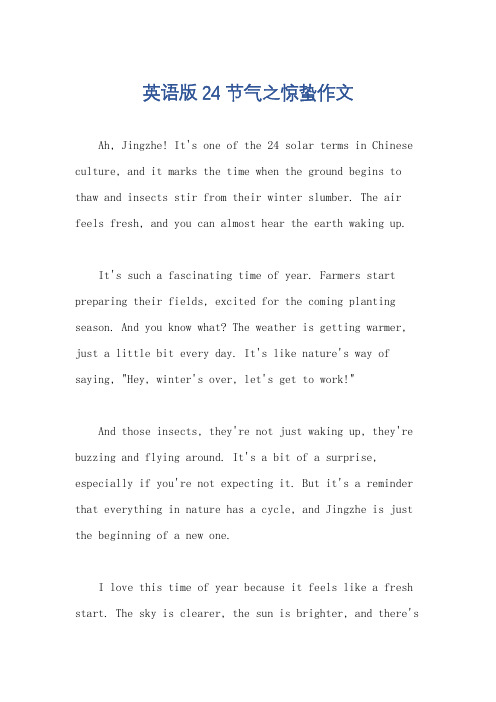
英语版24节气之惊蛰作文Ah, Jingzhe! It's one of the 24 solar terms in Chinese culture, and it marks the time when the ground begins to thaw and insects stir from their winter slumber. The air feels fresh, and you can almost hear the earth waking up.It's such a fascinating time of year. Farmers start preparing their fields, excited for the coming planting season. And you know what? The weather is getting warmer, just a little bit every day. It's like nature's way of saying, "Hey, winter's over, let's get to work!"And those insects, they're not just waking up, they're buzzing and flying around. It's a bit of a surprise, especially if you're not expecting it. But it's a reminder that everything in nature has a cycle, and Jingzhe is just the beginning of a new one.I love this time of year because it feels like a fresh start. The sky is clearer, the sun is brighter, and there'sa sense of hope in the air. It's a time to get outside, breathe in the new season, and enjoy the beauty of nature waking up from its winter sleep.。
关于惊蛰的英语作文100词
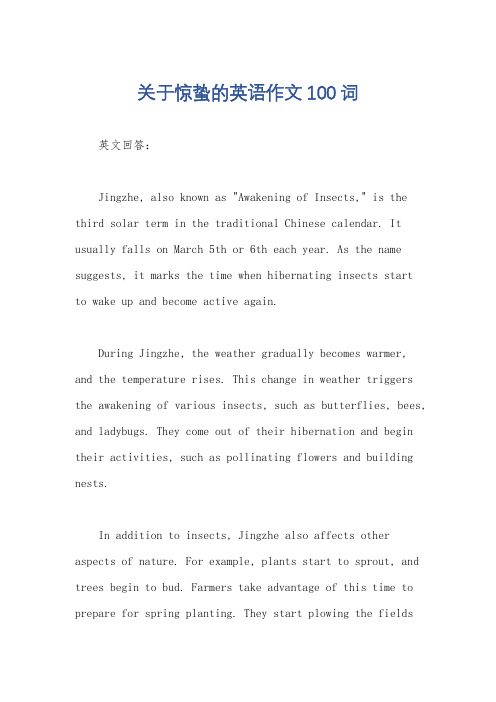
关于惊蛰的英语作文100词英文回答:Jingzhe, also known as "Awakening of Insects," is the third solar term in the traditional Chinese calendar. It usually falls on March 5th or 6th each year. As the name suggests, it marks the time when hibernating insects startto wake up and become active again.During Jingzhe, the weather gradually becomes warmer, and the temperature rises. This change in weather triggers the awakening of various insects, such as butterflies, bees, and ladybugs. They come out of their hibernation and begin their activities, such as pollinating flowers and building nests.In addition to insects, Jingzhe also affects other aspects of nature. For example, plants start to sprout, and trees begin to bud. Farmers take advantage of this time to prepare for spring planting. They start plowing the fieldsand sowing seeds, getting ready for a new agricultural season.Jingzhe is not only a solar term but also a cultural symbol in China. It represents the transition from winter to spring and the revival of all living things. People celebrate this time by participating in various customs and traditions. For instance, some people eat "Jingzhe cake," a traditional snack made from glutinous rice, to pray for good luck and a prosperous year ahead.中文回答:惊蛰,也被称为“春雷惊醒”,是中国传统农历中的第三个节气。
【课件】二十四节气之惊蛰中英双语课件

Thank you
惊蛰习俗 Traditional Customs
打“小人”: 人们经常指派特定的“女巫”(通常是一位老年妇女)去“打小人”。他们用 剪出人形的剪纸,代表生活中的“小人”,“女巫”会用鞋子或其他工具去 打“纸小人”,驱逐厄运。
Beating "villains": People often assign a specific “witch” (usually an elderly woman) to "beat the villains". They use paper cut in the shape of humans to represent "villains" in their lives and the "witch" would use shoes or other tools to hit the paper to expel bad luck.
Eating Pears: Eating pears around the Awakening of Insects is a widely-practiced custom in China. As the weather gets warmer and the air becomes dry, people tend to feel their mouths are parched and tongues dry, which can cause colds and coughs. A pear is sweet, juicy and cold, moistening the lungs to arrest a cough.
and waving willows make for a perfect weekend in spring.
惊蛰英文介绍
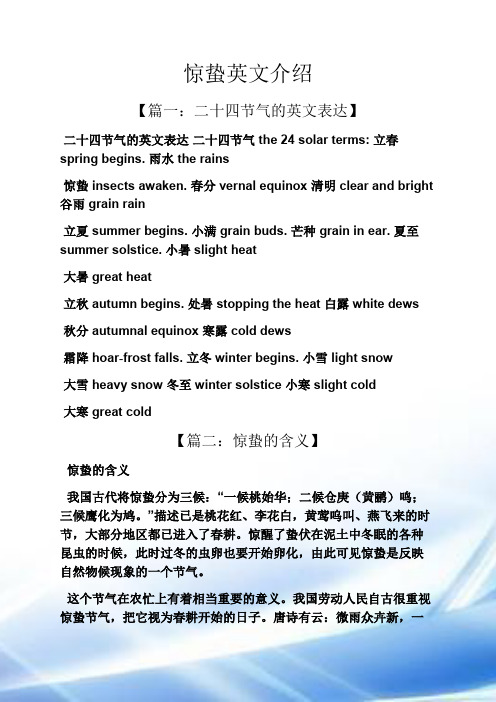
惊蛰英文介绍【篇一:二十四节气的英文表达】二十四节气的英文表达二十四节气 the 24 solar terms: 立春spring begins. 雨水 the rains惊蛰 insects awaken. 春分 vernal equinox 清明 clear and bright 谷雨 grain rain立夏 summer begins. 小满 grain buds. 芒种 grain in ear. 夏至summer solstice. 小暑 slight heat大暑 great heat立秋 autumn begins. 处暑 stopping the heat 白露 white dews秋分 autumnal equinox 寒露 cold dews霜降 hoar-frost falls. 立冬 winter begins. 小雪 light snow大雪 heavy snow 冬至 winter solstice 小寒 slight cold大寒 great cold【篇二:惊蛰的含义】惊蛰的含义我国古代将惊蛰分为三候:“一候桃始华;二候仓庚(黄鹂)鸣;三候鹰化为鸠。
”描述已是桃花红、李花白,黄莺呜叫、燕飞来的时节,大部分地区都已进入了春耕。
惊醒了蛰伏在泥土中冬眠的各种昆虫的时候,此时过冬的虫卵也要开始卵化,由此可见惊蛰是反映自然物候现象的一个节气。
这个节气在农忙上有着相当重要的意义。
我国劳动人民自古很重视惊蛰节气,把它视为春耕开始的日子。
唐诗有云:微雨众卉新,一雷惊蛰始。
田家几日闲,耕种从此起。
农谚也说:过了惊蛰节,春耕不能歇、九尽杨花开,农活一齐来。
华北冬小麦开始返青生长,土壤仍冻融交替,及时耙地是减少水分蒸发的重要措施。
惊蛰不耙地,好比蒸馍走了气,这是当地人民防旱保墒的宝贵经验。
沿江江南小麦已经拔节,油菜也开始见花,对水、肥的要求均很高,应适时追肥,干旱少雨的地方应适当浇水灌溉。
